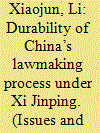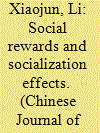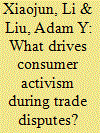| Srl | Item |
| 1 |
ID:
177739


|
|
|
|
|
| Summary/Abstract |
Investment Law (FIL) after a short deliberation period of only three months. This expedited legislative process seems unusual, considering that the original draft of the FIL proposed by the Ministry of Commerce in January 2015 was tabled indefinitely after a brief period of public consultation. How can we explain this stark difference? Comparing the legislative processes and contents of the two laws, this paper shows that, as with many previous laws, bureaucratic politics likely contributed to an impasse in the 2015 draft, whereas external shocks—in this case, the escalating trade war between China and the United States—helped accelerate the deliberation process and the passage of the new FIL. These two cases demonstrate the durability of lawmaking institutions and procedures under Xi Jinping despite the recentralization of power in the executive after changes to the constitution.
|
|
|
|
|
|
|
|
|
|
|
|
|
|
|
|
| 2 |
ID:
098872


|
|
|
|
|
| Publication |
2010.
|
| Summary/Abstract |
From the time China's UN membership was reinstated in 1972, the country has been a growingly active player on the world stage, having entered into economic cooperation, arms control, human rights and environmental protection with 150 international and non-governmental organizations (NGOs). Growing involvement in international institutions, however, implies binding oneself to their rules and regulations, including violation penalties. It can also mean forgoing certain national interests or even sovereignty rights. Although economic and material motivations often trigger the decision to cooperate, there are also instances where material motivations are less clear.
|
|
|
|
|
|
|
|
|
|
|
|
|
|
|
|
| 3 |
ID:
178324


|
|
|
|
|
| Summary/Abstract |
What drives consumer activism during trade disputes? We investigate this important and timely question using a survey experiment in the context of the recent Canada–US trade dispute. We find that Canadians are more likely to express willingness to take punitive actions in the form of boycotting during a trade conflict when they learn that Americans are taking such actions (retaliation), when many fellow citizens are taking such actions (peer pressure), and when they are rallied by their government (elite cue). Among the three conditions, peer pressure has the largest effect. These findings contribute to our understanding of the microfoundations of consumer activism during international trade disputes. They also have important policy implications in a world where both protectionism and populism are rising.
|
|
|
|
|
|
|
|
|
|
|
|
|
|
|
|